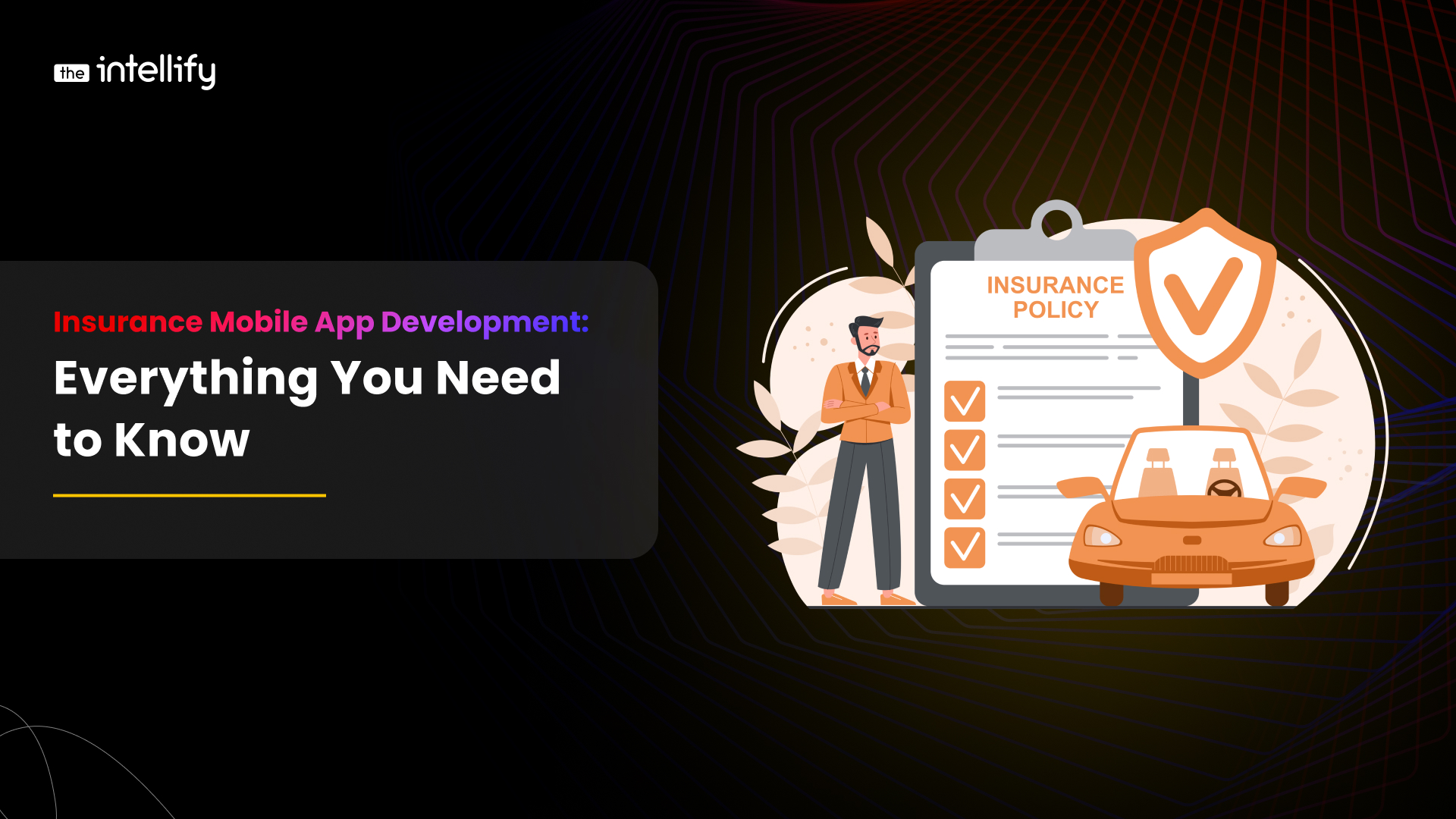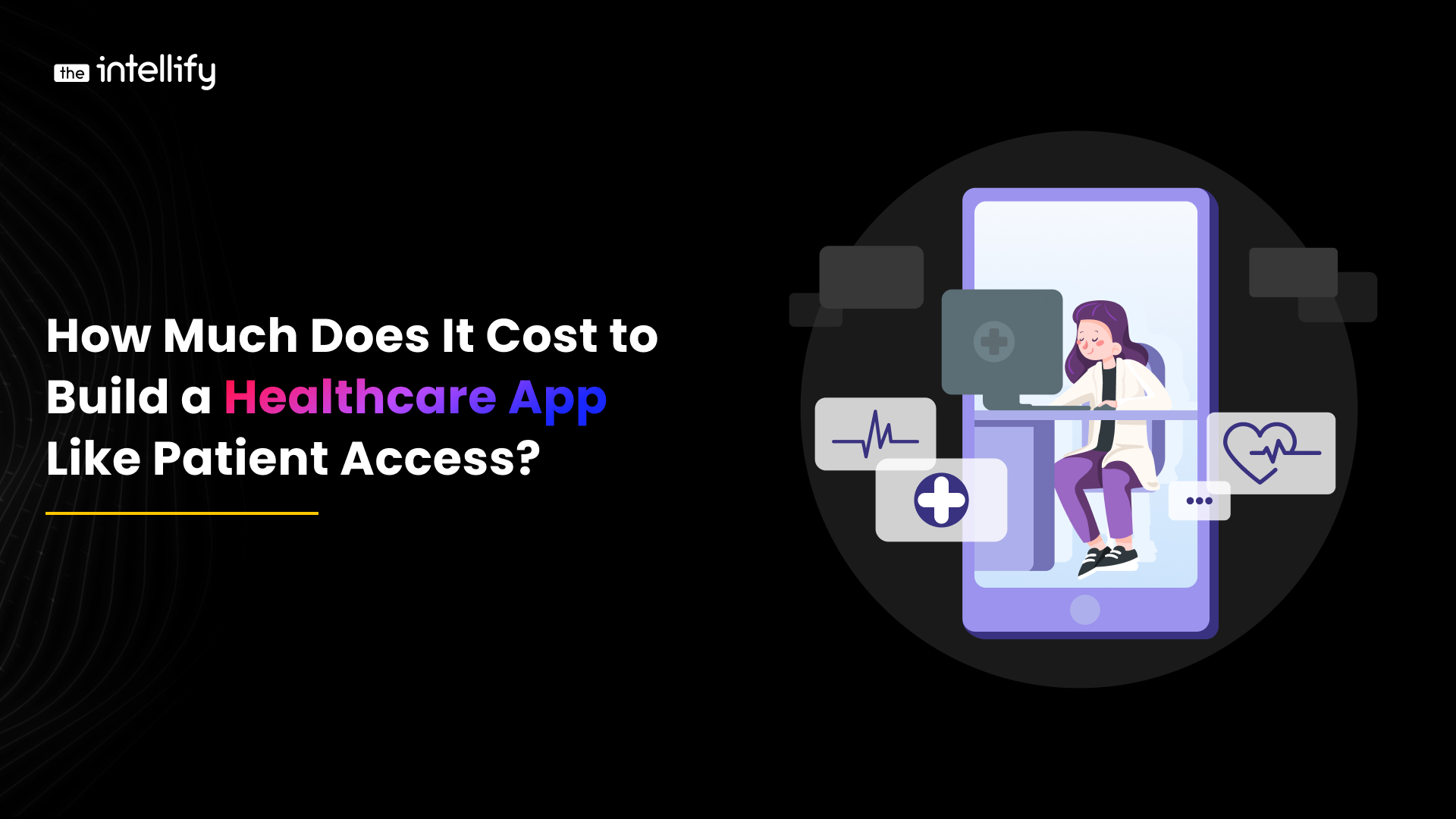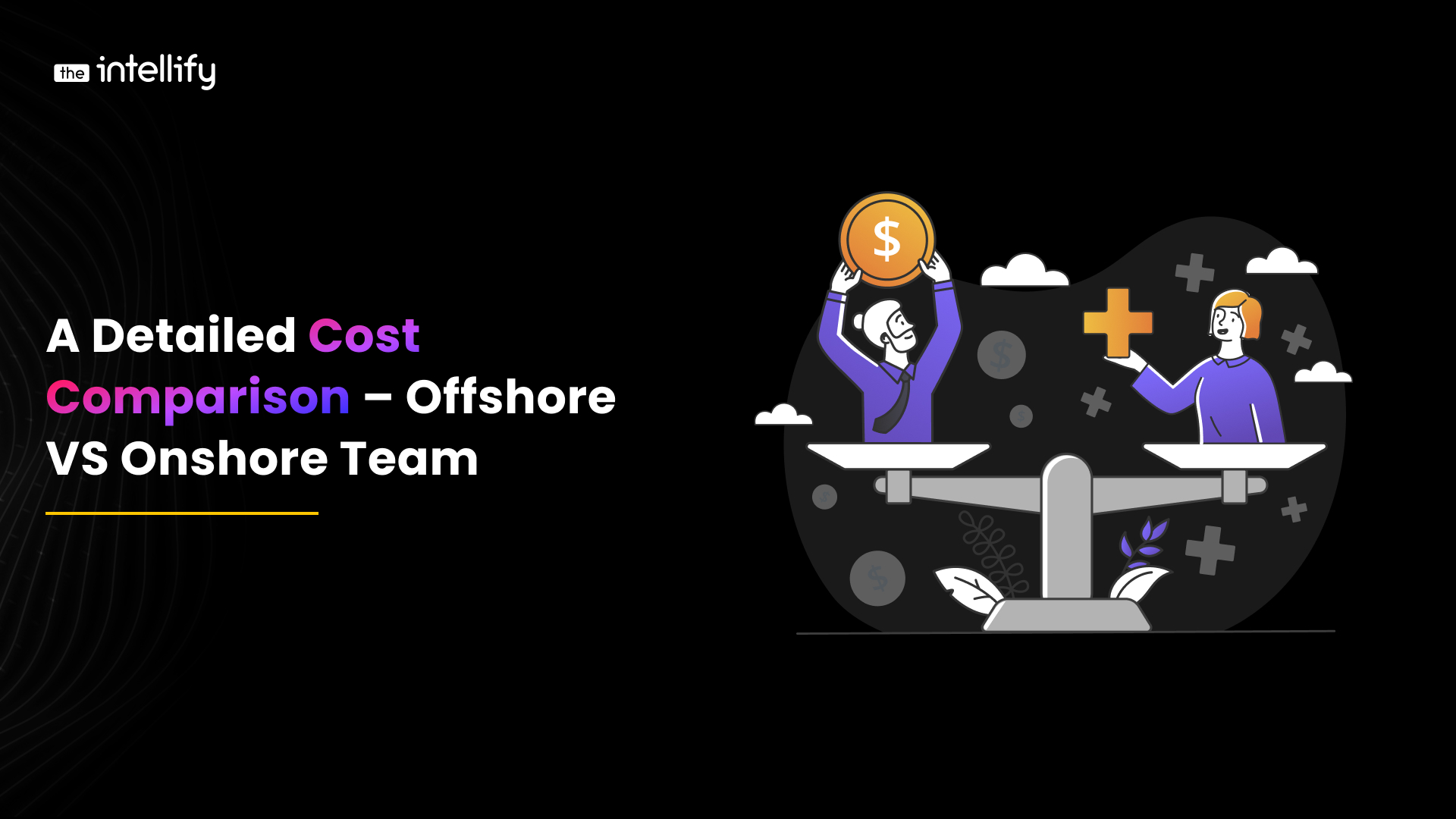Insurance Mobile App Development: Everything You Need to Know

By Jalaj Shah
April 16, 2024

In this fast-paced, mobile apps are no longer considered as a luxury product or investment. Every business has turned to technology to meet consumers’ ever-changing demands. And the insurance sector is no exception. Insurance businesses are finally starting to understand the need to create apps that provide smooth, quick solutions in response to the ever-growing demand for mobile-first experiences.
Statista predicts that the insurance industry will defy all odds and become one of the most dominant participants in the digital business scene by 2026, with a worldwide market value of $8.4 trillion. Suppose you are considering why your business requires it or how Mobile App Development Works; you have visited the right place. This blog will discuss all the ins and outs of insurance mobile app development, including its significance to developing insurance apps.
Insurance apps: what are they?
Insurance mobile apps are digital platforms that ease communication between insurance brokers, suppliers, and consumers. From enrollments to claim filing, support, and everything between. These cutting-edge solutions (online applications or mobile apps) speed up various processes and elements of managing insurance products, contracts, and settlements.
Furthermore, an insurance agency app is a hub where policyholders and insurers may exchange. And access data in real-time, including policies, premium estimates, renewal reminders, and payments.
Advantages of Insurance Mobile App Development for Your Business

The development of mobile apps provides insurance businesses with many advantages, allowing them to better respond to changing client demands and market conditions. The benefits of building an insurance mobile app are as follows:
Reaching Out to Customers
Engaging with customers is crucial in this digital age. Insurers may have direct, real-time conversations with their consumers using mobile applications. The immediate interaction improves the customer’s experience and fosters trust, essential for retaining loyal customers. Also, mobile apps provide tailored communication, responding to particular requirements.
Expanding User Base
Mobile applications allow insurance businesses to reach a wider audience by removing physical constraints. Apps help with client acquisition and retention via referral programs and easy user experiences. Insurers may expand their client base by improving recruiting cycles. And semantic marketing and take advantage of growth prospects.
Evaluation of Customer Data
Mobile analytics provide priceless information about understanding consumer habits and preferences. Insurers can find the best leads by gathering structured data like demographics, insurance claims history and other descriptive and qualitative details. This data-driven strategy makes personalized products. And upselling opportunities possible, boosting the efficacy of marketing.
Making Convenient Services Accessible
Insurance applications simplify procedures, allowing agents and clients easier access to services. Amid the COVID-19 epidemic, apps have become vital for business and interaction. Features such as claims processing, CRM tools, and client management improve operational efficiency and customer satisfaction.
Improving the Efficiency of Sales
Insurance mobile applications help agents be more productive at all times. Customer relationship management software may help agents handle leads, present items, and complete transactions from the move. Automation may streamline sales processes, leading to quicker conversions and better performance. This skill and adaptability aid sales growth and competitive edge.
Read More: What is InsurTech: Guide, Use Cases, and Insights 2024
Types of Insurance Apps

Insurance apps are useful for different types of insurance. Because they can be used for various situations and needs.
Car Insurance Mobile Apps
These apps make it easier for policyholders to deal with car accidents. Users may improve their driving experience by capturing accident facts, filing claims, and receiving repair estimates.
Health Insurance Apps
Despite their complexity, health insurance apps are crucial. To ensure people can get healthcare services. They streamline the process of navigating insurance policies, assist in finding physicians, and schedule appointments. And compare pricing for health plans and pharmacies.
Life Insurance Apps
Features, including policy selection, servicing, and payment processing. And customer help may be improved with the help of life insurance apps. Although these applications don’t need constant engagement, they improve user experience. And help insurance firms cut operational expenses.
Travel Insurance Apps
Mobile apps for travel insurance lower travel risks by covering medical emergencies, medical transport, and lost bags or travel papers. You may choose between automatic coverage while traveling between countries and pay-per-day insurance options.
Property Insurance Apps
These apps for investing in real estate can mitigate various dangers. In the case of a covered loss or damage to a building or its contents due to disasters, theft, vandalism, or fire, the owner can feel confident that they will recover.
Business Insurance App
These apps protect companies against a variety of threats and uncertainties. These policies cover buildings, equipment, inventory, and furniture. And assist companies in recovering in the event of property loss or damages caused by natural disasters, theft, or vandalism.
Important Features of an Insurance App
Must focus on features that improve the user experience and simplify operations. And guarantee reliability while developing an insurance app. Insurance applications often include the following important features:
Admin Panel
Consumers may access the most essential details on their insurance policies on the Admin Panel. It has to have clear buttons that users may click to take action. Users can access help tools and control their policies. And change their personal information, all from the admin page.
Policy Details
Insurance policy information, such as coverage details. And benefits should be accessible to users. The policy details section must include a thorough synopsis of the user’s present coverage, including policy limitations, deductibles, and any extra riders or endorsements.
Estimate and Filters
The app’s intended function lets users compare insurance rates according to their requirements and preferences. Using filters, consumers can compare policies and select the one that best matches their needs.
Claim Filings
The app’s primary function is to ease the filing of insurance claims. With the help of clear instructions and prompts for necessary information. The claims filing function should direct users through the procedure step by step.
Payment Gateway
Including a secure payment gateway to handle insurance premiums and payments is vital. Credit cards, debit cards, bank transfers, and mobile wallets are a few acceptable payment methods that users can use.
Customer Support
Live chat, callback requests, and connecting with a professional are a few of the customer support options that the insurance app should include. Customer support must be quick and responsive to resolve consumer queries and complaints.
Push Notifications
Push notifications may notify users of essential changes, impending insurance renewals, or special offers. They help keep users informed and involved with the app by sending alerts. And reminders about important information at the right times.
File Storage and Uploading
Insurance policy-related papers should be unloadable and stored for users. Users can access their policy documentation and insurance certificates. And claims paperwork from the app, ensuring they have them on hand whenever needed.
How to Build an Insurance Mobile App for Your Business?

The insurance mobile app development process needs careful planning and development. And collaboration with leading companies like The Intellify. If you need a roadmap to follow along, here it is:
Select the App’s Goal and Target Audience
To begin with, you must determine who you are designing your app for and what you want to use it for. By working with the insurance app’s developers, you can ensure they understand its purpose. This will be useful in outlining the app’s major features and creating an insurance app development roadmap.
Design a Easy-to-Use Interface
To ensure your app’s success, you must design an interface that is easy for users to navigate. To envision how the app will look when completed, it’s a good idea to keep up with current trends in mobile app design and make prototypes. These will serve as a roadmap for the app development process and may be shown to potential investors for their input.
Deciding on the Technology Stack
You must use the correct technological stack to create an effective insurance app. Before settling on a technology for your project’s front or back end, be sure it can scale, works with your platform, and is secure. Swift, Kotlin, Node.js, AWS, MySQL, and Stripe are among the most popular technologies used to create insurance mobile apps.
Analysis of Development and Quality
The insurance mobile app development team will turn the completed design into a functional app. The frontend and backend develop, and a project manager controls everything running and on schedule. Quality assurance (QA) experts will test the app to ensure its security and stability.
Installing and Maintenance
The last step is to put the app into insurance app marketplaces, such as the Apple or Google Play Store. Collecting user feedback and making fast adjustments can improve the app’s functionality and user experience. Routine maintenance is essential to fix any problems and ensure its smooth operation.
Factors affecting the Cost of creating an Insurance Mobile App
Many factors affect how much it will cost to build insurance mobile apps:
Project Objectives
The project’s goal is an important factor in establishing the budget. Whether the goal is to construct featured software with extensive functions or a minimal Minimum Viable Product (MVP) will affect the budget.
Types of Features
The total development cost is proportional to the app’s complexity and feature set. Compared to more complex capabilities like data analytics or AI-powered chatbots. The cost of basic services like user identification, policy administration, and claims filing will be cheaper.
Selecting a Framework for Development
The price will change depending on whether you’re making it for iOS App Development, Android App Development, or both. Building for both platforms is more costly and time-consuming than for only one.
Hours Spent
Cost is proportional to the time developers, designers, and team members spend. Projects with more features or that are more complicated will take more time to complete, driving up the cost. Hire Dedicated Developers from The Intellify on an hourly basis.
Project Size
The cost of a project depends on its scope, which includes factors like the number of screens, user flows, and the complexity of the backend. A larger budget will be necessary for projects with more features and components.
Integrity Level and Type
The development cost increases when third-party services or APIs, such as payment gateways, CRM systems, or data analytics tools integrate. The amount and complexity of needed integrations will affect the total cost.
So, the cost of designing an insurance app will increase if it is simple and has many features compared to a less complex app with fewer features. Insurance app development may cost anywhere from $35,000 to $250,000. Yet, that’s a ballpark figure.
How can The Intellify help you with Insurance Mobile App Development?
About insurance mobile app development, The Intellify is the go-to company for customized mobile insurance app development solutions that will take your insurance business to the top of its game. We are experts in creating top-notch mobile applications while keeping costs low so you get the most out of your money. From the first meeting to the final deployment, we keep scalability and efficiency in mind at every stage of insurance mobile app development.
The Intellify’s extensive background in the field means it knows the ins and outs of the insurance ecosystem worldwide. To boost app adoption rates and improve the user experience, we are experts in integrating complex features like voice analyzers, speech-to-text components, and AI-based chatbots.
At The Intellify, we want our customers’ insurance mobile apps to succeed. So, we provide dependable help and advice. If you want to transform your insurance business and remain ahead of the competition, you need to work with The Intellify to tap into the power of mobile technology.
Conclusion
Insurance applications are in high demand, attracting investment from well-established corporations and emerging businesses. Yet, making a good insurance app requires planning and key data access. Businesses may adapt to the ever-changing insurance industry by making well-informed decisions based on a thorough grasp of the benefits, features, kinds, and prices of insurance mobile app development.
FAQs
1. What are the benefits of insurance mobile apps for companies?
The use of mobile insurance apps has many benefits, including satisfied clients, easier claims processing, more client loyalty, and more accessible access to insurance information. It also helps businesses maintain a competitive edge in the modern digital market.
2. What are the most important aspects of an insurance app for mobile devices?
Management of policies, reporting of claims, payment of premiums, uploading documents, push notifications, and real-time connection with customer service are all important aspects. The user experience is further enhanced by integration with biometrics and digital payment options.
3. How can I ensure my app’s user data is secure?
Ensure that data encrypt while sent and stored. Follow all applicable rules and regulations on compliance. Perform security audits and ensure that your program and its components update with the latest security updates.
4. Is creating insurance apps that work on many platforms better?
Before deciding, consider your development timeline, intended audience, and available funds. Apps built for iOS and Android App Development provide the best performance, but cross-platform frameworks such as React Native and Flutter allow developers to reuse code, which saves time and money.

Written By, Jalaj Shah
The COO and Co-Founder of The Intellify. Jalaj enjoys experimenting with new strategies. His posts are fantastic for businesses seeking innovative development ideas. Discover practical insights from his engaging content.


Real Estate Mobile App Development 101: All You Need to Know
Today, the real estate industry is improving with the help of new technology. Mobile applications are one of the major aspects of this shift. Real estate mobile app development has become crucial for such businesses, which must remain relevant. The applications benefit buyers, sellers, agents, and property managers. In the contemporary world, individuals desire convenience […]


How Much Does It Cost to Build a Marketplace App Like Gumtree?
Detail Guide About Digital Marketplace like Gumtree The world is shifting online. Marketplace apps have emerged as major contenders. They bring buyers and sellers closer than ever. These platforms have cut the method of buying and selling. They have also fostered the market for both people and companies. Of all the marketplace apps, Gumtree is […]


Top 10 Healthcare Business Ideas to Boost Your Startup Success
Innovative Opportunities for Startups in Healthcare Startups find the healthcare sector promising. This is because demand for better and more accessible healthcare is growing. New technologies, like telemedicine and wearable health devices, create innovation opportunities. They also create chances for improvement in patient care. Blockchain technology can also enhance data security and streamline healthcare processes. […]


How Much Does It Cost to Build a Healthcare App Like Patient Access?
Costs of Developing Healthcare Apps In the quickly changing landscape of digital healthcare, patient-centric apps like Patient Access have emerged as critical tools for improving patient care and expediting medical procedures. These apps let users arrange appointments, access their medical information, manage medications, and contact healthcare providers from the comfort of their own homes. The […]


A Detailed Cost Comparison Offshore VS Onshore Teams
Detailed Cost Comparison Offshore VS Onshore Teams The world is always changing due to globalization. The choice between offshore vs onshore outsourcing teams is crucial for companies. Thanks to globalization, which erases boundaries. Organizations can depend on a vast talent pool worldwide. This has led to offshore outsourcing. In it, a team from another country, […]


Real Estate Mobile App Development 101: All You Need to Know
Today, the real estate industry is improving with the help of new technology. Mobile applications are one of the major aspects of this shift. Real estate mobile app development has become crucial for such businesses, which must remain relevant. The applications benefit buyers, sellers, agents, and property managers. In the contemporary world, individuals desire convenience […]

0
+0
+0
+0
+
Committed Delivery Leads To Client Satisfaction
Client Testimonials that keep our expert's spirits highly motivated to deliver extraordinary solutions.

Let’s start a Conversation about your Business Goals!
Drop us a line to Start a Project with us
Contacts For Business
Contacts For Career













